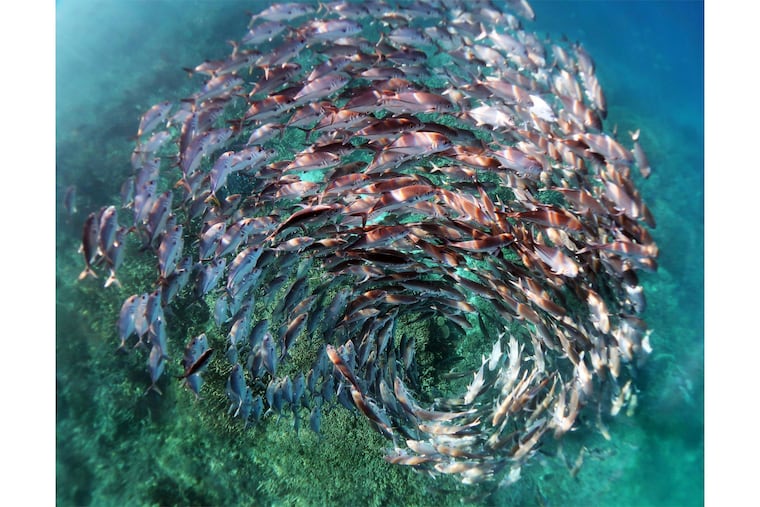Prizewinning photo by Penn biologist called metaphor for ‘spiraling crisis’ in the ocean
Kristen Brown captured the image while snorkeling in Australia's Great Barrier Reef.

While on Australia’s Great Barrier Reef for a three-month research project this year, University of Pennsylvania biologist Kristen Brown had time for fun as well, snorkeling in the azure waters of tiny Heron Island.
But even that leisure activity ended up serving the cause of science. One morning in February, the postdoctoral researcher photographed a school of fish in a mesmerizing spiral formation. The resulting image won first prize in an international science photo contest.
To Brown, her image is a visual metaphor for a “spiraling crisis” unfolding in the world’s oceans, wrought by overfishing, pollution, and climate change.
The judges of the competition, sponsored by BMC Ecology and Evolution, agreed. Josef Settele, a senior editorial board member of the London-based journal, wrote:
“Kristen Brown’s striking image is a symbol for the need for concentrated efforts to manage biodiversity loss and set conservation priorities.”
Climate change was the subject of Brown’s research on the island. Working with researchers from other institutions, she studied the ability of coral to withstand rising levels of acidity in the ocean, caused by carbon dioxide emissions that become dissolved in the water.
The fish that she saw while snorkeling, called jack fish, appear abundant in her photo. But such populations are becoming rarer with the climate-related decline in coral reefs, which are a rich source of habitat and food for marine creatures, she said.
Capturing the perfect photo took persistence. Day after day, Brown spotted the school of fish during her morning snorkel outing in the island’s harbor channel. She snapped hundreds of images until getting the one she wanted, using a Canon point-and-shoot camera inside an underwater housing.
“It actually took me four weeks to get that photo,” she said. “They were in perfect spiral formation.”
The results of the research, on the other hand, were not so promising, said Brown, who works in the lab of Katie Barott, an assistant professor of biology at Penn.
Brown and the other scientists studied a type of coral that spends several hours each day in temporary “lagoonal pools,” cut off from the ocean by the ebb and flow of the tide.
The water in these pools is more acidic, approaching the acidity level that climate scientists say could occur in the broader ocean by mid- to late century if carbon dioxide emissions are not reduced. So the researchers wondered if these corals, having adapted to temporary daily exposures to higher acidity, could handle that type of water all the time.
Preliminary evidence suggests the answer is no. When fragments of the coral were placed in tanks with constant exposure to higher acidity, they did not fare well, Brown said.
“We think that’s because the environment they live in is already quite stressful for them,” she said. “They’re kind of at the limit of what they can handle.”
Had this type of coral turned out to be hardier, scientists could have studied it to find what made it thrive, perhaps using the answers to improve the health of reefs elsewhere. As so often happens in science, more research is needed.
In the meantime, Brown is glad she can show the world why her research is valuable, thanks to a prizewinning photo.